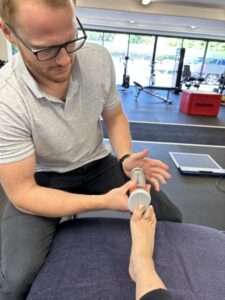Your feet are the base of everything you do—whether you’re walking, running, working, or chasing after your kids. So when they start acting up, it’s worth paying attention.
It’s easy to brush off foot discomfort, hoping it’ll settle down on its own. But your body has a clever way of giving early warning signs when something’s not quite right. And in many cases, the earlier you catch a foot problem, the easier it is to treat.

Here are some signs it’s time to book an appointment with a podiatrist:
1. Ongoing Foot Pain That Doesn’t Go Away
A little soreness after a long day is one thing—but pain that sticks around, especially without a clear reason, deserves a closer look.
Common types of pain we see include: 
- Heel pain (often caused by plantar fasciitis)
- Pain in the ball of the foot (known as metatarsalgia)
- Arch discomfort or foot cramps
If it’s been more than a few days and you’re still limping or adjusting how you walk, it’s time to get checked.
2. Swelling That Doesn’t Settle
It’s normal for your feet to swell a bit after a big day. But swelling that hangs around—or gets worse—isn’t something to ignore.
It could be related to:
- Joint inflammation from arthritis or gout
- Tendon injuries
- Circulation issues
Persistent swelling might be your foot’s way of saying, ‘Help!’
3. Changes to Your Skin or Nails
Your skin and nails can tell you a lot about your foot health. Keep an eye out for:
- Thickened, yellow, or crumbly toenails (possible fungal infection)
- Redness, warmth, or swelling (possible skin infection)
- Corns, calluses, or open sores that aren’t healing
These changes might seem minor, but they can signal more serious issues—especially if you have diabetes or poor circulation.
4. Numbness, Tingling, or ‘Pins and Needles’
That weird tingly feeling in your toes? If it keeps coming back, it could be a sign of a nerve issue like:
- Peripheral neuropathy, often linked with diabetes
- Nerve entrapment, where a nerve is compressed or irritated
Nerve-related symptoms can be subtle at first, but early treatment is key to preventing further damage.
5. Changes in the Way You Walk
Maybe you’ve noticed you’re walking a little differently—or your shoes are wearing down unevenly. These are signs your body might be compensating for a biomechanical issue, such as:
- Flat feet or high arches
- Overpronation or supination
- A leg length difference
A podiatrist can assess your gait and foot mechanics, and help correct imbalances before they lead to bigger problems up the chain (like knee, hip, or back pain).
6. Recurring Injuries
 If you’ve rolled your ankle more times than you can count, or you keep getting stress fractures in the same spot, it’s worth investigating why.
If you’ve rolled your ankle more times than you can count, or you keep getting stress fractures in the same spot, it’s worth investigating why.
At Pursue Health, our integrated approach brings together podiatry, physiotherapy, and sports medicine to treat not just the symptoms—but the root cause.
The Bottom Line? Don’t Tough It Out.
 We get it—foot pain can be easy to ignore, and it’s tempting to ‘wait and see.’ But catching things early often means a quicker recovery and a much smoother road ahead.
We get it—foot pain can be easy to ignore, and it’s tempting to ‘wait and see.’ But catching things early often means a quicker recovery and a much smoother road ahead.
If your feet are trying to tell you something, we’re here to listen.
Book a consultation with our expert team today and take the first step toward happier, healthier feet.
Call us on 9131 4977 or Book Online to get started.
